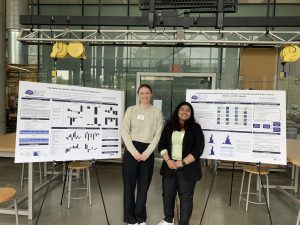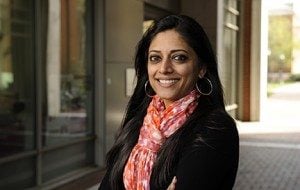Sri Sarma delivered a lightning talk about A Breakthrough in Epilepsy Diagnosis: Getting Patients the Right Answers, Faster at the BrainMind Science Collective in March 2025!
You can take a look at it here.
Sri Sarma delivered a lightning talk about A Breakthrough in Epilepsy Diagnosis: Getting Patients the Right Answers, Faster at the BrainMind Science Collective in March 2025!
You can take a look at it here.
Sri Sarma joins Mark Mattson on his Brain Ponderings podcast to discuss:
Neurological disorders involve aberrant neural network activity. New technologies are needed for establishing at a fine spatial and temporal resolution the nature of the altered network activity – and for restoring activity to or towards a healthy state. Professor Sri Sarma is an electrical engineer and neuroscientist who is at the forefront of this research field. Her research combines learning theory and control systems with neuroscience to develop novel approaches for understanding normal brain function and then developing brain – computer – electrophysiology feedback control systems to improve performance in health and disease. Her research and technology development is advancing personalized treatments for epilepsy, Parkinson’s disease, chronic pain, and depression.
Watch here on Spotify: https://open.spotify.com/show/39HsoeK8o7DtXIhepNCvfL
or here on YouTube: https://www.youtube.com/@brainponderingswithmarkmat648/videos
Sri Sarma has been named a fellow of the American Institute for Medical and Biological Engineering (AIMBE). She is among 171 engineers and researchers in this year’s class who were at an induction ceremony on Monday in Arlington, Virginia.
Johns Hopkins biomedical engineer Sri Sarma is developing new technologies to pinpoint the exact origin of seizures in the brain—life-changing work for the roughly 21 million epilepsy patients worldwide whose seizures aren’t relieved by medications.
Removing the specific brain region where seizures originate is the last resort when medication fails. But current clinical tools make precisely locating the epileptogenic zone (EZ) extremely difficult, rendering surgery effective in only about half the cases. With funding from the National Institutes of Health, Sarma and her team help surgeons determine if and where they should operate, improving the success rate of epilepsy surgeries.
Doctors could soon reduce epilepsy misdiagnoses by up to 70% using a new tool that turns routine electroencephalogram, or EEG, tests that appear normal into highly accurate epilepsy predictors, a Johns Hopkins University study has found.
By uncovering hidden epilepsy signatures in seemingly normal EEGs, the tool could significantly reduce false positives—seen in around 30% of cases globally—and spare patients from medication side effects, driving restrictions, and other quality-of-life challenges linked to misdiagnoses.
“Even when EEGs appear completely normal, our tool provides insights that make them actionable,” said Sridevi V. Sarma, a Johns Hopkins biomedical engineering professor who led the work. “We can get to the right diagnosis three times faster because patients often need multiple EEGs before abnormalities are detected, even if they have epilepsy. Accurate early diagnosis means a quicker path to effective treatment.”
Continue here … Link to article
Undergraduate research student Rina Dirickson presented her research on psychogenic non-epileptic attacks (PNEA) at the Gulf Coast Undergraduate Research Symposium at Rice University on November 9th. She was awarded the Outstanding Presentation Award for the Bioengineering section!
Rina particpated in the symposium and was recognized for her ability to explain her research to a diverse audience. GCURS was established to give undergraduate researchers the opportunity to practice and master this skill in a positive and nurturing environment and is sponsored by the Bioengineering Department at Rice University. https://gcurs.rice.edu/
 ety chapters of Johns Hopkins University and University of Maryland at College Park.
ety chapters of Johns Hopkins University and University of Maryland at College Park.The Sarma Lab is thrilled to congratulate Luis Sanchez who was awarded the NDSEG Fellowship! Out of 3392 applicants, Luis’s exceptional STEM achievements have been recognized. The National Defense Science and Engineering Graduate (NDSEG) Fellowship program was established in 1989 by direction of congress as an approach to increasing the number of United States (U.S.) citizens receiving doctoral degrees in science and engineering (S&E) disciplines to DoD Relevance.
The NDSEG Fellowship Program is sponsored by the Air Force Office of Scientific Research (AFOSR), the Army Research Office (ARO), and the Office of Naval Research (ONR) under the Office of the Under Secretary for Research and Engineering. This program is administered by Systems Plus, Inc.
Awardees receive full tuition and all mandatory fees coverage for up to 36 months and a monthly stipend of $3,600, up to $1,600 annually for health insurance coverage, and $5,000 travel budget (all expenses paid based on the Government travel policy per year for training and/or conferences that support their educational initiatives) and $1,500 non-travel professional development budget.
Sri Sarma was selected to receive an NIH Outstanding Investigator Award meant to help investigators make meaningful contributions to neuroscience by providing greater funding stability, flexibility, and support for overall research projects by funding up to $750,000 per year for up to eight years.
Sri’s proposal for the award, “EEG Biomarkers Derived from Dynamical Network Models Enable Rapid Paths to Accurate Diagnosis and Effective Treatment of Epilepsy,” seeks to establish novel EEG biomarkers and computational tools that will enable rapid and accurate diagnosis of epilepsy followed by a rapid path to an effective treatment.
Such a program entails major advances in conceptual knowledge of how epileptic cortical networks behave and change during drug and stimulation treatment, gleaned from dynamic network models (DNMs). Her lab has pioneered derivation of novel EEG biomarkers for epileptogenicity from DNMs and is well positioned to address major pain points in the workflow of diagnosing and treating epilepsy.
 Sridevi Sarma, associate professor of biomedical engineering and associate director of the Institute for Computational Medicine, is one of 10 recipients of the L’Oréal USA For Women in Science Program’s Changing the Face of STEM mentoring grants.
Sridevi Sarma, associate professor of biomedical engineering and associate director of the Institute for Computational Medicine, is one of 10 recipients of the L’Oréal USA For Women in Science Program’s Changing the Face of STEM mentoring grants.
The CTFS program supports former L’Oréal USA For Women In Science fellows in their efforts to inspire the next generation of girls in STEM. Awards are administered by the American Associate for the Advancement of Science.
“Inspiring the next generation of women in STEM is a key component of the For Women In Science program,” said Lauren Paige, vice president of public affairs and strategic initiatives at L’Oréal USA, in a press release. “We are proud to build on this commitment through our Changing the Face of STEM grant program and support our fellows in their efforts to promote STEM education in communities across the country.”
Sarma—a 2008 L’Oréal USA For Women In Science fellow—will use the grant to support a physics project with the Girl Scouts of Central Maryland. Five Girl Scout Cadette (grades 6-8) troops will come to Johns Hopkins University next spring and compete to build roller coasters out of household materials. The winning team will win tickets to Six Flags America.